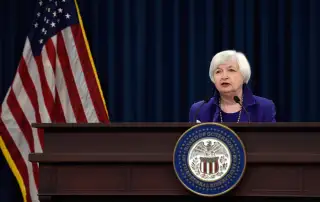The Fed's Janet Yellen Tells Congress What She Thinks About the Economy. Here's What it Means for You.

Federal Reserve chair Janet Yellen is delivering her biannual economic report to Congress today and tomorrow, against a backdrop that looks a lot different than Dec. 16, when the Fed confidently raised interest rates, pointing to a strengthening economy.
Today, troubles in China and slumping oil prices point to a much murkier global economic outlook. These developments, which have weighed down stock markets around the world, have also reduced the chances that the Fed will lift rates multiple times this year — as was expected in December. That's despite what Fed vice chairman Stanley Fischer was saying last month.
As a result, savers may not receive the higher yields on their cash accounts that they've been expecting a few months ago.
In fact, the debate has turned around so quickly that some in Congress are now wondering whether the Fed should cut interest rates, rather than raise them.
At the beginning of her testimony on Wednesday, Yellen told Congress that she's not sure if the Fed can legally do with other central banks around the world have begun toying with — that is, imposing negative interest rates. Under a negative rate scenario, the central bank would charge banks — rather than paying them interest — for parking excess reserves at the Fed to motivate lenders to deploy more cash.
Why the about-face? One good place to start is oil.
It's the Economy!
The price of a barrel of West Texas Intermediate crude oil fetched $37 at the start of the year, down by $70 a barrel in July 2014. But since January, oil has slid even further — to below $30.
Lower gas prices have, and will continue, to allow consumers to spend those saved dollars elsewhere, which should eventually boost economic growth, hiring and ultimately your raises. But it can take months for the effect of cheaper gas to work its way through the economy. In the meantime, investors are freaking out.
USAA Investment's John Jares told Money that people associate lower energy prices with a slowing economy, just like in 2008. Toss in slower growth in China, along with a devalued renminbi, and stocks endured their worst start to the year ever — the S&P 500 is down more than 8% so far this year. Meanwhile money is flocking to safe-haven Treasury securities, pushing prices up but yields down from 2.2% at the start of the year to 1.7% now. (Yields fall as bond prices rise.)
The Fed's mandate is to maximize employment and keep prices growing at a stable 2%. But lackluster economic growth abroad, combined with low energy prices and a strong dollar, has resulted in stubbornly low inflation.
"Given recent further declines in the prices of oil and other commodities, as well as the further appreciation of the dollar, the [Federal Open Markets] Committee expects inflation to remain low in the near term," noted Yellen in her prepared remarks. In fact the Fed doesn't expect 2% inflation, according to their preferred metric, for a couple of years.
Whither Interest Rates?
An underwhelming start to the year has returned Fed watchers to reading the tea leaves. Conventional wisdom has pushed off a rate hike until next year, while other market participants hedge their predictions on the economy's uncertain trajectory.
"We now look for a semi-annual rate-hike cadence this year, beginning in June, presuming U.S. economic indicators point to a return to above-potential growth, continuing job market improvements and budding inflation pressures, by this spring," notes BMO Capital Markets deputy chief economist Michael Gregory.
Winners & Losers
Of course higher interest rates result in some winners and losers. Savers, for one, would delight in more interest on their parked cash and would welcome a rate hike soon since it generally takes eight months for an interest rate increase to trickle down to them. Borrowers, especially those with credit card debt, will see higher borrowing costs, although not dramatically so.
If savers are frustrated by the gradual pace of interest rate hikes, they needn't worry themselves about a rate cut this year. Yellen told Congress that such a move was unexpected.
Unless, of course, things get worse.